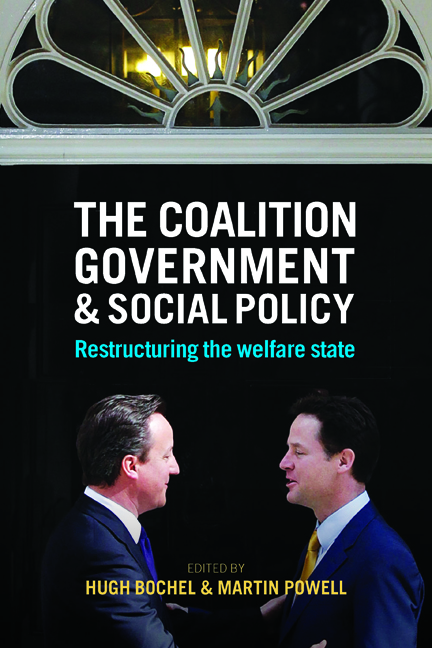Book contents
- Frontmatter
- Contents
- Notes on contributors
- One The transformation of the welfare state? The Conservative–Liberal Democrat coalition government and social policy
- Two The coalition government, public spending and social policy
- Three The changing governance of social policy
- Four The coalition, social policy and public opinion
- Five Health policy and the coalition government
- Six The coalition government, the general election and the policy ratchet in education: a reflection on the ‘ghosts’ of policy past, present and yet to come
- Seven Coalition housing policy in England
- Eight Social security under the coalition and Conservatives: shredding the system for people of working age; privileging pensioners
- Nine Welfare and active labour market policies in the UK: the coalition government approach
- Ten ‘It ain’t what you do, it’s the way that you do it’: adult social care under the coalition
- Eleven Family policy: the Mods and Rockers
- Twelve One step forward, two steps back: children, young people and the Conservative–Liberal Democrat coalition
- Thirteen The coalition and criminal justice
- Fourteen Equalities: the impact of welfare reform and austerity by gender, disability and age
- Fifteen Social policy, the devolved administrations and the UK coalition government
- Sixteen Conclusions
- Index
Thirteen - The coalition and criminal justice
Published online by Cambridge University Press: 01 September 2022
- Frontmatter
- Contents
- Notes on contributors
- One The transformation of the welfare state? The Conservative–Liberal Democrat coalition government and social policy
- Two The coalition government, public spending and social policy
- Three The changing governance of social policy
- Four The coalition, social policy and public opinion
- Five Health policy and the coalition government
- Six The coalition government, the general election and the policy ratchet in education: a reflection on the ‘ghosts’ of policy past, present and yet to come
- Seven Coalition housing policy in England
- Eight Social security under the coalition and Conservatives: shredding the system for people of working age; privileging pensioners
- Nine Welfare and active labour market policies in the UK: the coalition government approach
- Ten ‘It ain’t what you do, it’s the way that you do it’: adult social care under the coalition
- Eleven Family policy: the Mods and Rockers
- Twelve One step forward, two steps back: children, young people and the Conservative–Liberal Democrat coalition
- Thirteen The coalition and criminal justice
- Fourteen Equalities: the impact of welfare reform and austerity by gender, disability and age
- Fifteen Social policy, the devolved administrations and the UK coalition government
- Sixteen Conclusions
- Index
Summary
Introduction
A lot can happen in five years: the Conservative Party manifesto for the 2010 general election insisted that ‘Britain needs change’, and went on to claim that our ‘communities are shattered by crime and abuse’ (Conservative Party, 2010, p vii). Given such an urgent clarion call in 2010, it is fascinating how far explicit discussion of crime, disorder and criminal justice had slipped from the front lines of party-political concern by 2015. The 2015 Conservative manifesto did not begin any discussion of crime until page 58, in a section headed ‘Fighting crime and standing up for victims’. The Labour Party's discussion of crime, on page 51, referred to addressing crime and anti-social behaviour, and was set in the context of the insecurities facing families and communities, themes that had been set by the Blairite ‘tough on crime’ agenda (Labour Party, 2015). The Liberal Democrat discussion of law-and-order matters had to wait until page 117, where it comprised a number of fairly routine pronouncements on ‘secure communities, Policing and Justice, and the Border Force’ (Liberal Democrats, 2015, p 117). In five years of the Conservative–Liberal Democrat coalition government, therefore, law, order and criminal justice had apparently slipped from the front page to a back burner. Of course, consistently falling rates of reported and recorded crime may be part of an explanation for the ‘dog that ceased to bark’, except that this particular dog had fallen relatively silent despite the fact that a number of high-profile law-and-order issues had arisen during the government's term.
Some similar shifts were also reflected in government spending on law, order and protective services. According to Garside and Ford, for the Centre for Crime and Justice Studies:
UK spending on public order and safety – which largely comprises criminal justice – grew by 17 per cent in the four years to 2010. In the four years to 2014 it fell by 12 per cent. The cuts were greatest in England and Wales. (Garside and Ford, 2015, p 26)
The Institute for Fiscal Studies predicted that over the period 2010/11 to 2015/16, Home Office spending would have fallen by 24.9% and that of the Ministry of Justice by 34.3%.
- Type
- Chapter
- Information
- The Coalition Government and Social PolicyRestructuring the Welfare State, pp. 285 - 308Publisher: Bristol University PressPrint publication year: 2016



